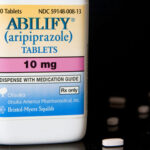Why Take Aripiprazole In The Morning (4 Benefits)

Aripiprazole is a medication used to treat a variety of mental health conditions, including schizophrenia, bipolar disorder, and depression. It was first approved by the United States Food and Drug Administration (FDA) in 2002.
The development of aripiprazole began in the 1980s when researchers at Otsuka Pharmaceutical Co., Ltd., a Japanese pharmaceutical company, began searching for a new antipsychotic medication. They were specifically looking for a medication that would have a different mechanism of action than existing antipsychotics, which tended to have significant side effects.
The researchers discovered that aripiprazole worked by binding to both dopamine D2 and serotonin 5-HT1A receptors in the brain. This unique mechanism of action allowed aripiprazole to be effective in treating schizophrenia and bipolar disorder while minimizing side effects.
Aripiprazole was first approved for use in Japan in 1999 and was subsequently approved in the United States in 2002. Since then, it has become one of the most widely prescribed antipsychotic medications in the world.
In addition to its use in mental health conditions, aripiprazole has also been approved for the treatment of autism-related irritability in children and adolescents, and as an adjunctive treatment for major depressive disorder.
How Aripiprazole Works
Aripiprazole works by acting on several neurotransmitter systems in the brain. It is classified as an atypical antipsychotic medication. One of the primary ways that aripiprazole works is by acting as a partial agonist at dopamine D2 receptors.
This means that it has a similar chemical structure to dopamine and can bind to the same receptors in the brain, but it does not stimulate the receptors as strongly as dopamine itself. This partial agonist activity helps to normalize dopamine signaling in the brain, which can improve symptoms of schizophrenia and bipolar disorder.
Aripiprazole also acts as a partial agonist at serotonin 5-HT1A receptors. Serotonin is another neurotransmitter that plays a role in mood regulation, and the 5-HT1A receptor is thought to be involved in the pathophysiology of depression and anxiety. By binding to these receptors, aripiprazole can help to modulate serotonin signaling and improve symptoms of depression and anxiety.
In addition, aripiprazole has antagonist activity at serotonin 5-HT2A receptors, which may help to reduce the risk of extrapyramidal side effects (such as tremors and muscle stiffness) that are often associated with traditional antipsychotic medications.
Overall, the unique combination of partial agonist and antagonist activity at dopamine and serotonin receptors makes aripiprazole an effective medication for treating a variety of mental health conditions, while minimizing side effects.
How Is Aripiprazole Taken
Aripiprazole is available in several different forms, including tablets, orally disintegrating tablets and an injectable formulation.
The tablets are usually taken orally once a day, with or without food, and should be swallowed whole with water. The orally disintegrating tablets are designed to dissolve quickly in the mouth and can be taken with or without water.
The injectable formulation of aripiprazole is given as an injection into a muscle by a healthcare professional. It is typically administered once every 4 to 6 weeks, depending on the specific formulation and the individual’s treatment plan.
The dose of aripiprazole will depend on the individual’s condition, age, weight, and other factors. It is important to follow the dosage instructions provided by the healthcare provider and not to adjust the dose without their guidance.
For the treatment of schizophrenia in adults, the recommended starting dose of aripiprazole is usually 10 to 15 mg per day. The dose may be increased gradually up to a maximum dose of 30 mg per day, based on the individual’s response and tolerance to the medication.
For the treatment of bipolar disorder in adults, the recommended starting dose of aripiprazole is usually 15 mg per day. The dose may be increased gradually up to a maximum dose of 30 mg per day, depending on the individual’s response and tolerance to the medication.
For the treatment of major depressive disorder in adults, aripiprazole is usually prescribed as an adjunctive treatment to an antidepressant medication. The recommended dose is usually 2 to 15 mg per day, depending on the individual’s response and tolerance to the medication.
For the treatment of autism-related irritability in children and adolescents, the recommended starting dose of aripiprazole is usually 2 mg per day, and the maximum dose is 15 mg per day, depending on the individual’s weight.
It is also important to continue taking aripiprazole as prescribed, even if symptoms improve. Suddenly stopping the medication can cause withdrawal symptoms and may lead to a relapse of the underlying condition.
If a dose of aripiprazole is missed, it should be taken as soon as possible, unless it is almost time for the next scheduled dose. In that case, the missed dose should be skipped and the regular dosing schedule resumed.
Why Take Aripiprazole In The Morning
Aripiprazole is typically recommended to be taken in the morning because it can have a stimulating effect and may interfere with sleep if taken too late in the day. Taking the medication in the morning can help to minimize these side effects and promote better sleep at night.
In addition, taking aripiprazole in the morning can help to maintain consistent blood levels of the medication throughout the day, which may improve its effectiveness in treating mental health conditions such as schizophrenia and bipolar disorder.
However, it is important to follow the dosage instructions provided by the healthcare provider and take aripiprazole at the same time each day. If a dose is missed, it should be taken as soon as possible, unless it is almost time for the next scheduled dose. In that case, the missed dose should be skipped and the regular dosing schedule resumed.
Aripiprazole Side Effects
Aripiprazole can cause side effects. The severity and frequency of these side effects can vary from person to person, and some individuals may not experience any side effects at all. Some of the common side effects of aripiprazole include:
1. Nausea
2. Headache
3. Dizziness
4. Insomnia
5. Constipation
6. Fatigue
7. Restlessness
8. Weight gain
9. Increased appetite
10. Dry mouth
Some less common but potentially serious side effects of aripiprazole include:
1. Suicidal thoughts or behavior
2. Neuroleptic malignant syndrome (a rare but serious condition that can cause fever, muscle rigidity, and other symptoms)
3. Tardive dyskinesia (a movement disorder that can cause uncontrollable muscle movements)
4. Seizures
5. Low blood pressure
6. Difficulty swallowing
7. Allergic reactions, including rash, itching, and difficulty breathing
If any of these serious side effects occur, medical attention should be sought immediately. It is also important to discuss any side effects or concerns with the healthcare provider, as they may be able to adjust the dose or recommend other interventions to minimize the side effects.





